- Home
- Clive Barker
Days of Magic, Nights of War Page 23
Days of Magic, Nights of War Read online
Page 23
“And how was that?” Candy asked.
“Oh, you know. A woman of power—”
“Me? You must have the wrong—”
“Oh, no. You’re the one. You wouldn’t be here if you weren’t.”
“Speaking of being here . . .”
“Yes?”
“There was a boy outside the house.”
“Letheo. Yes, we found him.”
“Is he all right?”
“He’s under Mister Masper’s protection now,” the woman said. “Please go on.”
“So he is all right?” Candy pressed.
“I told you—”
“—he’s under Mister Masper’s protection.”
With that the woman turned her back on Candy and started along down the corridor.
“What’s your name, by the way?” Candy said.
“Mrs. Kittelnubetz,” the woman replied without turning. “It is my honor to work for Mister Masper.” She paused at the door, and respectfully, even a little cautiously perhaps, opened it. “Enjoy,” she said, ushering Candy in.
“Enjoy what?” Candy said, looking into the room.
“The dreaming street,” said Mrs. Kittelnubetz.
And as she spoke, a light came on in the middle of the room (which, unlike the other rooms, and the passageway, had been in darkness). The light illuminated an odd-looking wooden device that sat on a table there. It was round, perhaps eight or nine inches high, and two feet or so in diameter. Its outer wall was highly polished, suggesting somebody took great care of this device. Whatever it was, it had slits in it, each no more than a quarter of an inch wide.
“What is that?” Candy said, glancing back at Mrs. Kittelnubetz. But the passageway was empty. In the fifteen, perhaps twenty seconds since Candy had taken her eyes off the woman in black she had gone, leaving Candy’s question unanswered.
“Weird,” Candy remarked.
She hadn’t seen anything yet. When she looked back at the device, she saw that it had begun to go around, as though a small clockwork motor in its base had been activated. And visible through the slits there was a growing brightness. Fascinated—and thinking there could surely be no harm in a clockwork musical box, or whatever it was—Candy approached the table, bending down as she did so and peering through the slits into the circling drum.
Whoosh, whoosh, whoosh —
There was something almost hypnotic about the sound, and about the motion too. A contented smile came onto her face, and the more relaxed she felt, the brighter the light in the center of the drum seemed to burn.
Whoosh, whoosh, whoosh —
Was there something moving in there? It looked as though there was. She narrowed her eyes, trying to focus her gaze on whatever was inside the spinning drum. There was a name for old-fashioned devices like these, she remembered. They were called zoetropes, or something like that. They had pictures inside that were arranged to create the illusion of movement.
“That’s cool . . .” she said, leaning closer.
And still the drum picked up speed, until the slits spun by so quickly that they all blurred together into a single window.
And what was the picture on the other side? She’d been expecting something simple, but no: there was a sunlit street there in the drum. And the houses and the sidewalks, the roofs and sky weren’t painted: they were perfectly realistic. And sauntering up and down the street, as though this were a real day and a real world, were men, women (even an ape or two); black people and white, golden skinned and scarlet. What they all had in common, however, was the extraordinary things they wore on their heads. These didn’t appear to be hats or hairpieces; they were strange fantasias rising like many-layered towers from their skulls.
Candy stared at the spectacle in astonishment, her gaze still being gently coaxed through the spinning window into “the dreaming street” vision the drum contained. She could almost feel it pulling on her, seducing her with its brightness and its beauty, to keep looking, keep looking, while the drum spun, keep looking—
She had by now guessed what she was seeing. Mrs. Kittelnubetz had named this mystery for her: the dreaming street, she’d called it. Its formal name, which was Marapozsa Street, was written on a sign on the wall, but its nickname was surely more accurate. Here on this bright thoroughfare the people were not simply wearing entertaining nonsenses on their heads because it was the fashion. These were their dreams they were carrying. A man wandered by with what looked like a single-windowed tower on his head, burning fiercely. On another there was built a cell in which some poor soul was bound up; yet another (a man with a large fish under his arm, which he was presumably taking home to dine on) had a tiny theater poised on his pate, with a skull-headed creature standing center stage.
But the illusions contained in the device were only just the beginning. Her sight was still being drawn into the midst of the spectacle; there were new visions to be seen around every corner, through every doorway and open window: glimpses of lives that weren’t being performed, the way a play is performed, but were going on quite naturally as she casually watched. A woman was studying at an upper window with her hair like a thicket filled with little colored birds. In another place stood a striped beast about the size of a middle-sized mutt, long lashed and stubby tailed, which had on its head a little building, no more than a dome supported by six pillars: the humble animal equivalent, perhaps, of the elaborate towers that the two-legged occupants of Marapozsa Street boasted.
The zebratic dog seemed to be staring straight at Candy, its gaze so direct that it drew her attention still more deeply into the world of Marapozsa Street. Suddenly it seemed to become uncomfortable having her staring at it, and it turned tail and ran. She followed it with her eyes, down an alleyway that ran off Marapozsa Street. Again she had that uncanny sensation of being drawn into this little world, but why not, she thought? Where was the harm? The animal led her away down streets that steadily grew narrower the farther from Marapozsa Street they strayed. But at every corner, however narrow the thoroughfares became, and however decrepit the buildings, there were still oddities and wonderments to be witnessed.
A pale man stood at one corner, looking down with bliss on his face at the child he held in his arms, even though the infant had tentacles for limbs. In another place a woman sat with a very large and succulent slice of pizza (pepperoni, mushrooms, olives; no anchovies) on her lap.
Candy had lost sight of the animal she’d followed from the dreaming street, but she didn’t much mind. She had plenty more to see, like the man who looked as though he had the blood of clowns running in his veins and was painting something fanciful on the walls. Or the patchwork animal that stood patiently in a piece of sunlight, feeding her infants, two of whom were suckling from her greedily, while a third clung to her leg in an ecstasy of love.
Clowns. Mothers. Dreamers. What a strange world this was she’d been drawn into. She was beginning to feel a little overwhelmed by the experience: not just by the sights but the sounds and smells of the place. It was time to turn back, she decided; time to unglue her sight from this place and return to the room where she was standing. But how? She’d come this far following the path of her curiosity. But how did she retrace her steps?
Perhaps if she simply closed her eyes, she thought, the illusion would somehow vanish and she’d be back in the room with Masper, watching the device from a safe distance.
But that didn’t work. Though she closed her eyes and waited in darkness for a few seconds, when she opened them again she was still standing in the same place, trapped inside the device.
“What’s going on?” she said to a pregnant woman with a small forest sprouting from her head. “Why can’t I get out of here?”
The woman looked at her with a puzzled expression on her face, as though she didn’t understand a word Candy was saying.
“Can’t somebody tell me what’s going on?” Candy asked.
It was the red-faced ape that finally proffered an answer: “Where are
your dreams?” he said. “Everybody wears their dreams on their heads here.”
“But I don’t belong here,” Candy protested. “I came from outside.”
“Outside?” said the bearded man with the fish under his arm. “There is no outside!”
“Oh yes, there is,” Candy replied. “I’ve been there.”
She looked up at the “sky,” hoping there’d be proof of the room beyond this artificial world. But she could see no sign of her confinement. Only a flawless blue.
She felt a spasm of panic. Suppose the journey she’d taken into this world was strictly one-way? Perhaps the dreaming citizens of Marapozsa Street had once all been, like her, guileless visitors to this place. Visitors who found that once they were in this strange world they couldn’t get out again. And as time passed they had forgotten that they’d even had a life beyond Marapozsa Street.
Well, it might have happened to them, but it wasn’t going to happen to her! She hadn’t taken a journey through the wonders of the Abarat—risking life, limb and sanity in the process—to end up a prisoner in some artificial world.
“I want to get out of this place!” she yelled. “And I want to get out NOW! Somebody has to be able to hear me.”
She threw back her head. “Mister Masper! Are you there? MISTER MASPER!”
“Just show us your dreams,” said the man wearing the burning tower on his head. “Come on!”
“No!” said Candy.
“Don’t be perverse,” said a stately woman with an elaborate pillar of dream fragments on her head. Her voice, curiously, sounded not unlike that of the man with the burning tower. Strange.
“Show us,” said another of the wanderers, his voice an echo of the others. “We want to see your dreams!”
“I’ll keep them to myself,” Candy said.
“Show us,” said the man with the fish, moving toward her.
“Don’t make us force you,” said the ape.
“Keep away,” Candy said.
The man took no notice of Candy’s warning. He reached around behind his back and snatched hold of the tail of the fish, as if he intended to hit her with it. She didn’t give him the opportunity. She snatched the fish out of his hand and aimed a strike at the dream things he had perched on his head. They were fragile. The pieces flew in all directions.
The man unleashed a howl of horror.
“My dreams!” he yelled. “Look what you’ve done to my precious dreams!”
The cry was instantly taken up all along Marapozsa Street, as those who’d witnessed Candy’s blow and its consequences sent up their own cries.
“Make her show us!”
“Let’s see your dreams, girl!”
“Right now! Let’s see them!”
They were advancing on her from all sides, their once placid faces now twisted up in fury. She attempted to protest her innocence, but they weren’t interested in listening to her. Her only option was to turn her back on them and run. She looked back over her shoulder. The news wasn’t good. She was prevented from leaving the street by a wall of darkness. The sight was accompanied by a familiar sound.
Whoosh! Whoosh! Whoosh!
The spinning slits were passing in front of her, perilously close to her face. If she chose the wrong moment to jump, she’d surely hit the solid partition between the slits, which would not be good news. But how was she to know when it was best to jump? It was like trying to get aboard a fast-spinning carousel. If she mistimed her jump, she risked being knocked senseless; or worse, caught in the mechanism somehow, and carried around and around and—
“Just do it,” she told herself, and the next moment she was in the air, flying and falling. There were a few seconds of pure terror when the world became a blurred place filled with the din of grinding cogs and uncoiling springs. She feared her nightmare had come true and she’d fallen into the spinning mechanism. Behind her she heard the dreamers yelling to her that she was going to die, stupid witch, and good riddance, because she deserved to die. The sound of the cogs and springs became so loud she had to put her hands over her ears to shut it out. Even that didn’t work. The noise still bled through, making her head throb.
“Stop it!” she yelled.
Perhaps her demand was heard; or perhaps it was simply good luck that brought her through the spinning slits. Whichever it was, she was released from the wracking din of the mechanism and fell forward, through the slits and out the other side. The sound suddenly ceased, and she found herself lying on a threadbare carpet, her head aching.
“Hello,” said a voice.
She looked up. There was a man, dressed in dark gray, standing close to the door. “Are you all right?” he said.
“Yes . . . yes . . .” she said, doing her best to get to her feet. From the corner of her eye she saw the device, still spinning. She could hear the whoosh of the device, as powerful as ever. And more distantly, voices from Marapozsa Street.
“Did I . . . ?”
“Did you what?” the man said, offering a hand to help her get to her feet.
“It felt as though I was drawn into that thing.” She shook her head to see if she could rid herself of the sense of dislocation. Only when it had receded a little did she trust herself to raise her head and look at the man who was standing in the room with her.
“I’m Mister Pius Masper,” he said to her. “And I own this house.”
Chapter 34
Secrets and Meat Loaf
ACROSS THE IMMEASURABLE DIVIDE between the Abarat and the Hereafter—in Chickentown, Minnesota—things were calmer than they had been of late. The curiosity and the concern that had been stirred up by the anonymous wall defacer at the Comfort Tree Hotel had cooled into general indifference, its position in people’s order of gossip-worthy subjects overtaken by the fact that the town’s mayor, Harold Meadows, had been accused of taking bribes to overlook certain infringements of health policy (specifically that the runoff from the chicken factory’s slaughterhouse should empty directly into the town’s drains, making the taxpayers of Chickentown liable for the cleaning of the clogged pipes). As a result of this scandal, Harry Meadows was performing a rather humiliating dance of denial so as not to be thrown out of office, and his “I-didn’t-do-it” two-step had the town’s eyes on him.
There were a few exceptions, a few stalwarts who still patrolled outside the hotel night and day, watching for some evidence of supernatural manifestations. And there were even two officers at the police department who gave an hour a day to investigating the disappearance of Candy Quackenbush. But the truth was that these were no longer urgent issues. The citizens of Chickentown had other stuff to debate.
Even at 34 Followell Street—at the Quackenbush residence—talk of Candy had become such a source of irritation to Bill Quackenbush recently that Ricky and Don had taken the path of least resistance and simply never talked about her within hearing distance of her father.
And then, one day when they had all sat down for supper and Bill had drained a couple of cans of beer, he said: “I got some news for everyone.”
“What about, Dad?” Rick wanted to know.
“About all of us,” Bill Quackenbush said, cracking another beer. “I was talking to your mom about me leaving Chickentown. Going to Chicago or maybe Denver. But now I’m thinking we should all leave. As a family.”
The boys both started talking at the same time.
“Chicago!”
“When would we go?”
“What about school?”
Melissa raised her hands to hush the excitement. “We’re not going anywhere,” she said, looking fiercely at her husband. “Not until Candy comes home. Not until we’re a family again.”
“She ran away,” Bill replied, enunciating the words as though he were speaking to an imbecile. “And Melissa, she is not coming back; at least no time soon. Maybe she’ll come knockin’ on the door in a few years with three kids and no husband. But right now she’s gone, and the quicker we quit thinking she’s gonna turn up
again anytime soon, the quicker we can all get back to living regular lives again.”
“But Dad—” Ricky said, his eyes brimming. “We can’t just forget—”
“Don’t you start cryin’,” Bill said, pointing to his son. “You hear me, Rick? I swear, if you start bawlin’ like some dumb-ass girl I’m gonna give you somethin’ to bawl about.”
Ricky sniffed hard and by sheer effort of will kept the tears from coming.
But Don, who was completely dry-eyed, had some arguments of his own. “Suppose she comes back here,” he said. “And we’re not here. How will she find us?”
“She ain’t that stupid,” his father said. “She’ll ask around until she finds a neighbor who knows where we went.”
“I don’t want to go to a new school in a new town,” Don went on. “I like my old friends.”
“You’ll make new friends,” Bill said. “And one school’s just like the next.”
“You’ve obviously thought all this through,” Melissa said coldly. “Exactly when were you going to tell the rest of us? Or were we just going to wake up one morning all packed and ready to go?”
“I’m the head of the household,” Bill replied. “I get to make these important decisions. If I don’t make ’em, who will?”
“Oh yeah, that’s you, Bill,” Melissa said. “Mister Responsibility.”
“Can I leave the table now, please?” said Ricky, staring down at his congealed macaroni and cheese and his dried-up meat loaf.
“You haven’t eaten anything, honey,” said his mother.
“I’m not hungry.”
“Neither am I,” said Don.
“All right, you’re excused,” said Melissa.
The two boys couldn’t get away from the table fast enough.
“I’m not changing my mind about this,” Bill said after he drained the can of beer. “I’m not going to rot here. Day after day with nothing to do.”
“Then get a damn job, Bill.”
“There aren’t any.”
“There are plenty.”

 The Great and Secret Show
The Great and Secret Show Coldheart Canyon: A Hollywood Ghost Story
Coldheart Canyon: A Hollywood Ghost Story Galilee
Galilee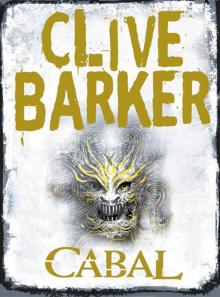 Cabal
Cabal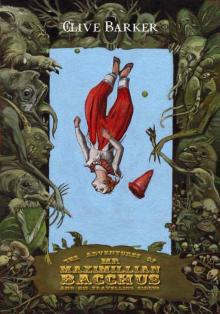 The Adventures of Mr. Maximillian Bacchus and His Travelling Circus
The Adventures of Mr. Maximillian Bacchus and His Travelling Circus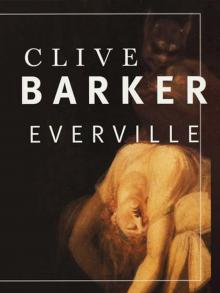 Everville
Everville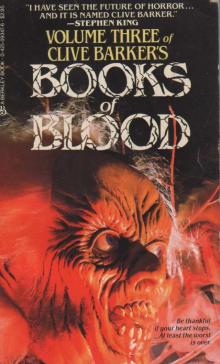 Books of Blood: Volume Three
Books of Blood: Volume Three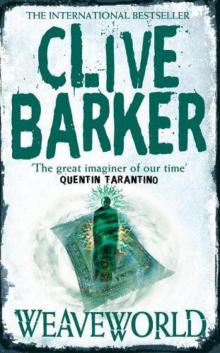 Weaveworld
Weaveworld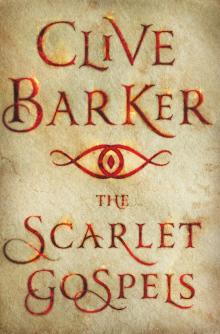 The Scarlet Gospels
The Scarlet Gospels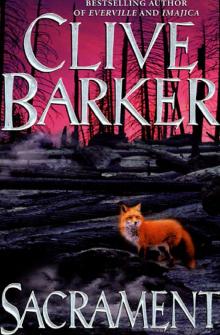 Sacrament
Sacrament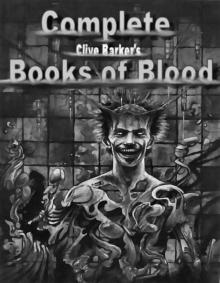 Books of Blood: Volumes 1-6
Books of Blood: Volumes 1-6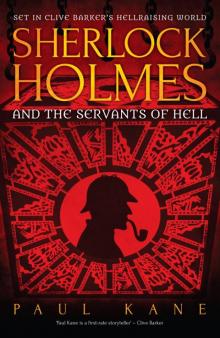 Sherlock Holmes and the Servants of Hell
Sherlock Holmes and the Servants of Hell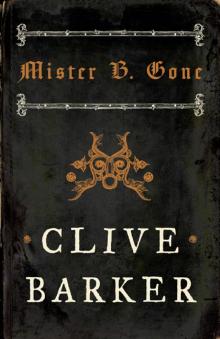 Mister B. Gone
Mister B. Gone Imajica
Imajica The Reconciliation
The Reconciliation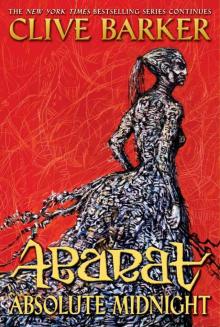 Abarat
Abarat Clive Barker's First Tales
Clive Barker's First Tales The Hellbound Heart
The Hellbound Heart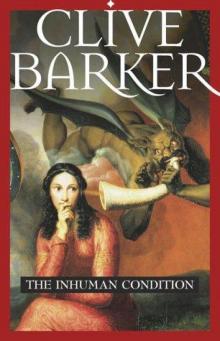 The Inhuman Condition
The Inhuman Condition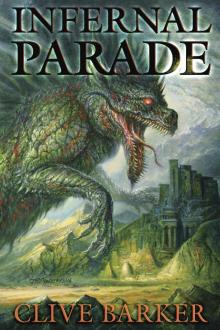 Infernal Parade
Infernal Parade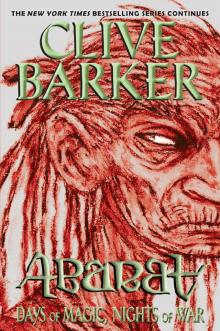 Days of Magic, Nights of War
Days of Magic, Nights of War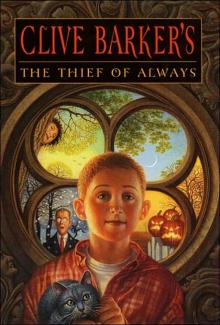 The Thief of Always
The Thief of Always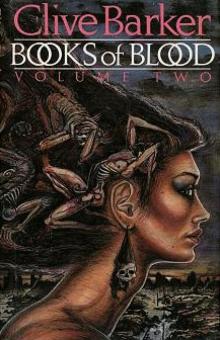 Books of Blood Vol 2
Books of Blood Vol 2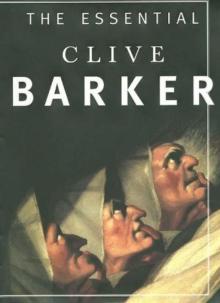 The Essential Clive Barker
The Essential Clive Barker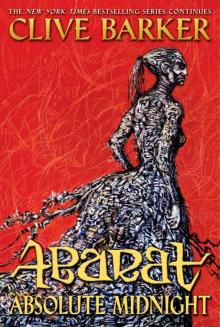 Abarat: Absolute Midnight a-3
Abarat: Absolute Midnight a-3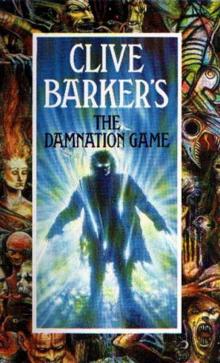 The Damnation Game
The Damnation Game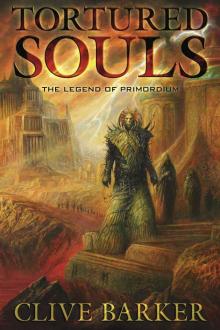 Tortured Souls: The Legend of Primordium
Tortured Souls: The Legend of Primordium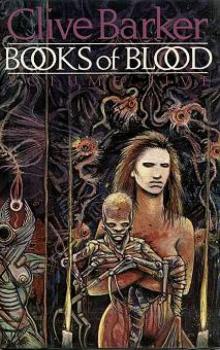 Books of Blood Vol 5
Books of Blood Vol 5 Imajica 02 - The Reconciliator
Imajica 02 - The Reconciliator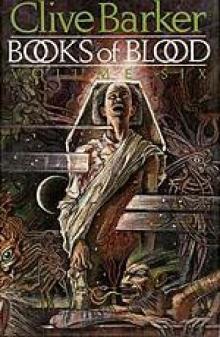 Books Of Blood Vol 6
Books Of Blood Vol 6 Imajica 01 - The Fifth Dominion
Imajica 01 - The Fifth Dominion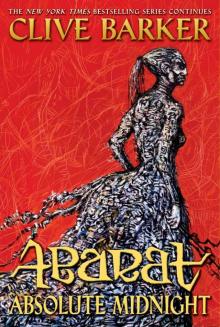 Abarat: Absolute Midnight
Abarat: Absolute Midnight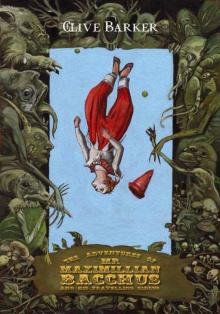 The Adventures of Mr. Maximillian Bacchus & His Traveling Circus
The Adventures of Mr. Maximillian Bacchus & His Traveling Circus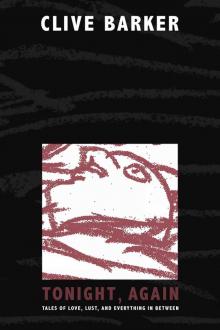 Tonight, Again
Tonight, Again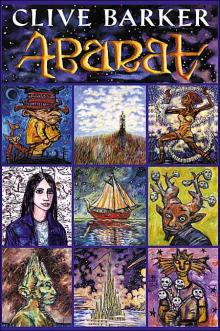 Abarat: The First Book of Hours a-1
Abarat: The First Book of Hours a-1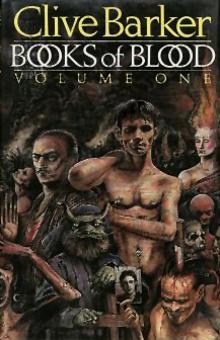 Books Of Blood Vol 1
Books Of Blood Vol 1 Age of Desire
Age of Desire Imajica: Annotated Edition
Imajica: Annotated Edition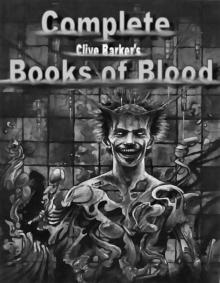 Complete Books of Blood
Complete Books of Blood Gutted: Beautiful Horror Stories
Gutted: Beautiful Horror Stories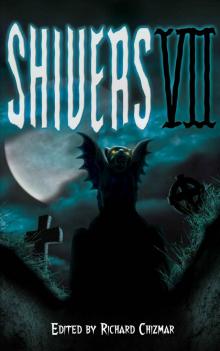 Shivers 7
Shivers 7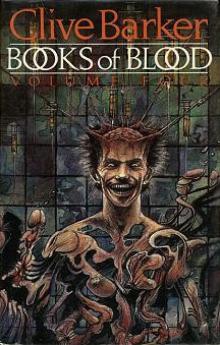 Books Of Blood Vol 4
Books Of Blood Vol 4